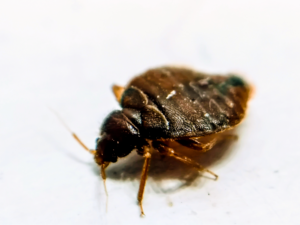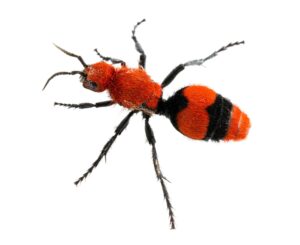Home / Blog / bugs / Does Mulch Attract Bugs?
Does Mulch Attract Bugs?

Scientifically reviewed by Rachel Maldonado
-Published on August 23, 2024
-Updated on December 3, 2025
Does Mulch Attract Bugs?
Have you noticed more bugs buzzing around your garden lately?
Maybe you’ve added fresh mulch, and now you’re wondering if there’s a connection.
Spoiler alert – there is, but not all mulch is created equal. Let’s dig into the nitty-gritty of how mulch can affect your garden’s bug population and what you can do about it.
What is Mulch?
Mulch is a layer of material spread over the soil’s surface. It’s mainly used to retain moisture, improve soil health, reduce weed growth, and enhance the visual appeal of your garden.
There are several different types of mulch, including organic options like wood chips and straw, and inorganic options like gravel, rubber, and plastic.
Different kinds of mulch have different effects on your garden’s ecosystem. Organic mulch decomposes over time, adding nutrients to the soil, while inorganic mulch does not. Knowing the type of mulch you’re using can help you understand its impact on your garden.
How Mulch Attracts Bugs
You might think mulch is just a decorative layer for your garden, but it’s actually a cozy home for many bugs.
Organic mulch, in particular, can attract different types of insects for three key reasons:
- Moisture: Mulch helps retain soil moisture, which is great for plants but also perfect for bugs. Insects like termites, ants, and beetles thrive in damp environments.
- Cover: Mulch provides a dark, sheltered environment that bugs love. It’s like a five-star hotel for them – safe from predators and the harsh sun.
- Food Source: As organic mulch breaks down, it becomes a food source for many bugs, especially those that feed on decomposing plant material.
Types of Bugs Attracted to Mulch
Not all bugs are harmful, but knowing which ones are attracted to mulch can help you manage your garden better.
In addition to pests like booklice, centipedes, earwigs, fungus gnats, and pillbugs, here are a few common types of bugs you might find living in your mulch:
Termites
Termites are perhaps the most concerning insects that mulch can attract. These tiny pests can cause significant damage to wooden structures, including your home – in fact, they’re responsible for causing more than $5 billion in damages to homeowners each year, on average, in the United States.
Unfortunately, they happen to be particularly attracted to wood-based mulches like wood chips and bark – both mulches that are commonly used in landscaping around homes.
Ants
Ants are another common visitor to mulched areas. While most ants are harmless, some species, like fire ants, can be a nuisance and even pose a threat to humans and pets.
Beetles
Beetles of all kinds may find mulch appealing, too. While some beetles are beneficial, others can be harmful to your garden plants.
Organic vs. Inorganic Mulch
When it comes to controlling the bug population in your garden, not all mulch is alike. Some types are more beneficial than others.
Organic Mulch
While organic mulch is excellent for improving soil health, it also attracts more bugs. Wood chips, straw, and leaves are all organic materials that decompose and provide a habitat for insects.
If you prefer organic mulch, it’s essential to monitor your garden regularly for any signs of pest infestation.
Inorganic Mulch
Inorganic mulches, such as gravel, stones, and plastic, do not decompose and hence do not attract bugs in the same way organic mulches do.
But they also do not contribute to soil health the way organic mulch does. Nevertheless, inorganic mulch might be a better option if your primary concern is pest control.
Benefits of Mulch – Despite the Bugs
It’s not all bad news – mulch offers several benefits that can outweigh the potential bug problems.
- Moisture Retention: Mulch helps retain soil moisture, reducing the need for frequent watering. This is especially beneficial in dry climates.
- Weed Control: A good layer of mulch can suppress the growth of weeds, making your garden easier to maintain.
- Soil Health: Organic mulch improves soil structure and nutrient content as it decomposes, promoting healthier plant growth.
How to Minimize Bug Attraction
If you’re concerned about bugs but still want to enjoy the benefits of mulch, here are some strategies to minimize bug attraction.
Choose the Right Type of Mulch
Again, you should opt for inorganic mulches if bugs are a significant concern. If you prefer organic mulch, consider using cedar or cypress mulch, which are less attractive to insects.
Keep Mulch Away from Structures
Make sure to keep mulch at least 12 inches away from the foundation of your home and other wooden structures. This will reduce the likelihood of termites and other pests finding their way inside.
Regular Maintenance
Regularly turning over the mulch can help disrupt bug habitats and discourage them from settling in. Also, replacing old mulch with a fresh layer can reduce bug problems.
Use Mulch Sparingly
Sometimes less is more. Using a thinner layer of mulch can still provide benefits without creating a haven for bugs.
Don’t Let Your Mulch Become a Haven for Pests
Mulch can attract bugs, but that doesn’t mean you should avoid using it altogether – it still offers countless benefits.
By understanding the types of mulch and their effects, you can make informed decisions that benefit your garden while keeping pests under control. Choosing the right mulch, regular maintenance, and strategic placement can help you enjoy the many benefits of mulch without turning your garden into a bug hotel.
Feeling overwhelmed by pests despite your best efforts? Join our family of satisfied customers at Hawx Pest Control. Take the first step towards a bug-free garden today!
Related Articles
Visit our blog to learn more.
→






